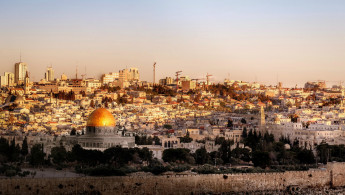UNESCO to vote on new controversial report on Jerusalem
UNESCO will vote on a report concerning the status of Jerusalem's Old City that is likely to anger Israel.
2 min read
Israeli leader Netanyahu wants UN staff to attend a seminar on Jewish history [Getty]
UNESCO's World Heritage Committee is due to approve or reject a conservation report on the status of the Old City of Jerusalem and its Walls on Wednesday.
The text, sponsored by Palestinians and Jordanians, is likely to rile Israel for denying the Jewish state's historic links to holy sites and referring to "aggressions by the Israeli Occupation Authorities."
The Committee's 21 member states are holding their annual meeting in Paris.
Last week, UNESCO's executive board adopted a resolution that Israel says denies the deep historic Jewish connection to holy sites in Jerusalem.
The resolution refers to "Occupied Palestine" and is critical of Israel's management of Palestinian religious sites, but it is the names used to describe key sites that appear to have infuriated Israel the most.
It refers to the al-Aqsa Mosque compound in east Jerusalem's Old City – Islam's third holiest site – only by its Muslim name. The site is known to Jews as the Temple Mount.
A UNESCO official said the organisation had received threatening calls over the resolution.
Last Thursday, Israeli Prime Minister Binyamin Netanyahu complained saying, "Israel has no connection to the Temple Mount and Western Wall is like saying China has no connection to the Great Wall of China or Egypt has no connection to the pyramids."
The al-Aqsa Mosque compound in east Jerusalem, which was taken by Israel in the 1967 Six-Day War and later annexed in a move not recognised internationally, has long been a flashpoint in the conflict between Israelis and Palestinians.
In April, UNESCO passed a resolution condemning "Israeli aggressions and illegal measures against the freedom of worship and Muslims' access to the al-Aqsa Mosque", also failing to mention the site's Jewish name of the Temple Mount.
That led Netanyahu to propose a "seminar on Jewish history" for UN staff in Israel.
In 2011, the Palestinians were admitted as a member state of the organisation, which led the US – Israel's key ally – to suspend its payments to UNESCO.
The text, sponsored by Palestinians and Jordanians, is likely to rile Israel for denying the Jewish state's historic links to holy sites and referring to "aggressions by the Israeli Occupation Authorities."
The Committee's 21 member states are holding their annual meeting in Paris.
Last week, UNESCO's executive board adopted a resolution that Israel says denies the deep historic Jewish connection to holy sites in Jerusalem.
The resolution refers to "Occupied Palestine" and is critical of Israel's management of Palestinian religious sites, but it is the names used to describe key sites that appear to have infuriated Israel the most.
It refers to the al-Aqsa Mosque compound in east Jerusalem's Old City – Islam's third holiest site – only by its Muslim name. The site is known to Jews as the Temple Mount.
A UNESCO official said the organisation had received threatening calls over the resolution.
Last Thursday, Israeli Prime Minister Binyamin Netanyahu complained saying, "Israel has no connection to the Temple Mount and Western Wall is like saying China has no connection to the Great Wall of China or Egypt has no connection to the pyramids."
The al-Aqsa Mosque compound in east Jerusalem, which was taken by Israel in the 1967 Six-Day War and later annexed in a move not recognised internationally, has long been a flashpoint in the conflict between Israelis and Palestinians.
In April, UNESCO passed a resolution condemning "Israeli aggressions and illegal measures against the freedom of worship and Muslims' access to the al-Aqsa Mosque", also failing to mention the site's Jewish name of the Temple Mount.
That led Netanyahu to propose a "seminar on Jewish history" for UN staff in Israel.
In 2011, the Palestinians were admitted as a member state of the organisation, which led the US – Israel's key ally – to suspend its payments to UNESCO.





 Follow the Middle East's top stories in English at The New Arab on Google News
Follow the Middle East's top stories in English at The New Arab on Google News
![22 Arab countries at COP29 have rejected the targeting of fossil fuels [Getty]](/sites/default/files/styles/image_330x185/public/2024-11/GettyImages-2184289638.jpg?h=199d8c1f&itok=ptHl5bec)
![Dozens of people turned out for the funerals [Getty]](/sites/default/files/styles/image_330x185/public/2024-11/GettyImages-2185229760.jpg?h=e7c891e8&itok=1bctDcE6)
![The UAE is widely suspected of arming the RSF militia [Getty]](/sites/default/files/styles/image_330x185/public/2024-11/GettyImages-472529908.jpg?h=69f2b9d0&itok=Yauw3YTG)